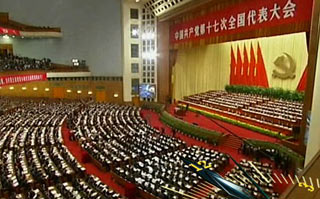China
China issues first ever white paper on political party system
WATCH VIDEO
Source: CCTV.com | 11-15-2007 13:30
Special Report: 17th CPC National Congress |
The Information Office of the State Council has just issued the country's first ever white paper on its political party system.
China's political party system is one of multi-party cooperation and political consultation under the leadership of the Communist Party of China, or CPC. The white paper introduces in detail the formation, main characteristics, basic contents and development of the system. The system has unique political advantages and plays an irreplaceable role in political and social life.
The system is well suited to China and adapted to the reality of the country's revolution, construction and reform. It is also very suited to the essential demands of socialist democracy. The system reflects Chinese cultural traditions which stress maintaining harmony while respecting diversity.
The multi-party cooperation system is a new and unique type of political party system.
The CPC holds the leading and ruling position. And the eight democratic parties participate in and deliberate on state affairs. The CPC and the democratic parties work closely together and supervise each other. This system is in accordance with the system of people's congresses to ensure the people are the master of the state.
China's multi-party cooperation system has a unique structure, functions as well as operational mechanism. It guarantees the full exercise of the people's democratic rights.
One major feature of China's socialist democracy is the combination of democratic election and democratic consultation.
The value and function of the multi-party cooperation system are manifested as political participation, expression of interests, social integration and democratic supervision...as well as maintenance of stability.
Political consultation is a major aspect of the multi-party cooperation system. The CPC consults with the various democratic parties and political figures without party affiliation on major state issues... before making decisions and in the process of implementing the decisions.
Since 1990, the CPC Central Committee and the State Council have organized over 230 consultation conferences, seminars and briefings. They have received over 200 important written proposals covering a wide range of subjects...from the central committee of democratic parties.
The National People's Congress is the organ through which the Chinese people exercise state power; it is also an important place where the roles of the democratic party members are brought into play.
A key part of the multi-party cooperation system under the leadership of the CPC -- is that democratic party members take leadership positions in government and judicial organs.
The State Council and government at all levels are opening up new channels for them to participate in and discuss state affairs.
The Chinese People's Political Consultative Conference is an important institution for multi-party cooperation and political consultation under the leadership of the CPC, and a major form of socialist democracy in China. Members of democratic parties are important constituent parts of the CPPCC.
The major roles of CPPCC members from democratic parties: to participate actively in political consultation, exercise democratic supervision and discuss state affairs.
All democratic parties continue to promote development as the first priority. They carry out investigations and surveys on important issues and then make constructive proposals.
With the advantage of a high concentration of talented members, all democratic parties hold activities to promote development.
All the democratic parties make full use of their important role as coordinators and problem solvers to do a good job of reporting social conditions and public opinions.
By making full use of their rich resources of contacts, all democratic parties have made active efforts to expand exchanges and to bring foreign capital, technology, expertise and management experience to China.
Editor:Zhang Ning



